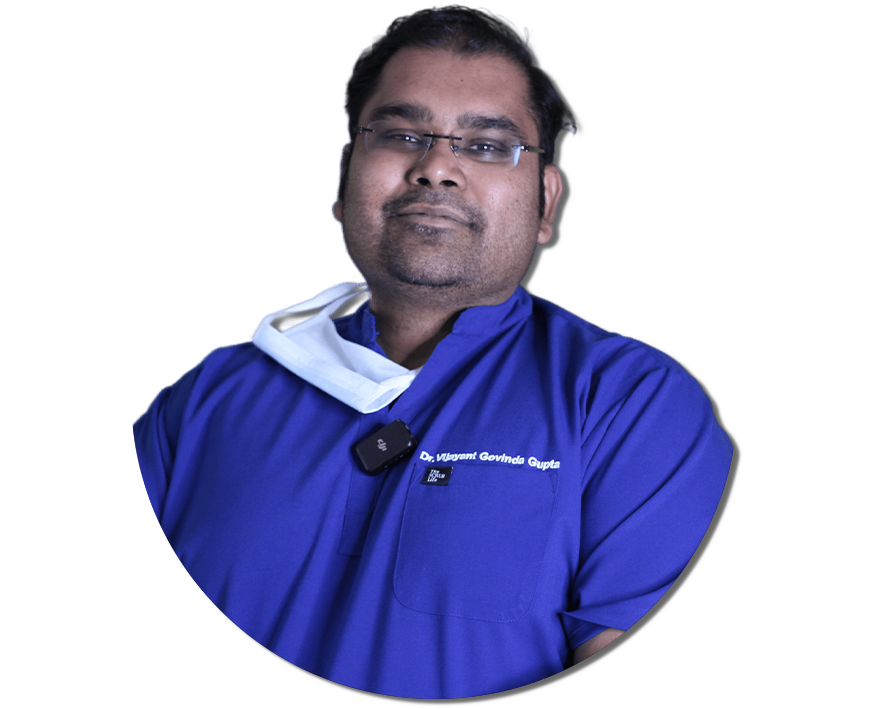Kidney stones are hard deposits made of minerals and salts that form inside your kidneys. They can vary in size, from as small as a grain of sand to as large as a golf ball. While smaller stones may pass naturally through the urinary tract, larger ones can cause severe pain and may require medical intervention. If you’re looking for kidney stone treatment in Delhi, Dr. Vijayant Govinda Gupta offers expert care to diagnose and treat kidney stones effectively.
What Are Kidney Stones?
Kidney stones (also known as renal calculi or nephrolithiasis) are solid masses formed when minerals and salts crystallize in the kidneys. These stones can develop anywhere in the urinary tract, including the kidneys, ureters, bladder, and urethra.
Types of Kidney Stones
There are different types of kidney stones based on their composition:
- Calcium Oxalate Stones – The most common type, formed when calcium combines with oxalate in the urine.
- Uric Acid Stones – Caused by high levels of uric acid, often linked to a high-protein diet.
- Struvite Stones – Result from urinary tract infections (UTIs).
- Cystine Stones – Caused by a rare genetic condition called cystinuria.
Symptoms of Kidney Stones
The most common symptom of kidney stones is severe pain in the lower back, side, or abdomen. This pain may come in waves and vary in intensity. Other symptoms include:
✅ Intense pain while urinating
✅ Blood in urine (hematuria)
✅ Frequent urge to urinate
✅ Nausea and vomiting
✅ Cloudy or foul-smelling urine
✅ Fever and chills (if an infection is present)
Causes of Kidney Stones
Kidney stones form when urine becomes concentrated, allowing minerals and salts to crystallize and stick together. Common causes include:
- Dehydration – Not drinking enough water increases the concentration of minerals in urine.
- Diet – High intake of sodium, protein, and oxalate-rich foods (like spinach and nuts) can increase the risk of stones.
- Medical Conditions – Conditions like gout, hyperparathyroidism, and urinary tract infections can lead to stone formation.
- Family History – A genetic predisposition can increase the likelihood of developing kidney stones.
Diagnosis of Kidney Stones
Dr. Vijayant Govinda Gupta uses advanced diagnostic tools to accurately identify and assess kidney stones, including:
✔️ Ultrasound – A non-invasive imaging test to detect stones.
✔️ CT Scan – Provides detailed images of the urinary tract.
✔️ X-ray (KUB) – Helps locate and measure stones.
✔️ Urine Test – Identifies crystals, blood, or signs of infection.
✔️ Blood Test – Measures calcium and uric acid levels to determine the cause of stones.
Best Kidney Stone Treatment in Delhi
Dr. Vijayant Govinda Gupta offers specialized treatments for kidney stones based on their size, type, and location:
1. Medical Management
For small stones, medications, and increased fluid intake may help pass the stone naturally. Commonly prescribed medications include:
- Tamsulosin – Relaxes the ureter to facilitate stone passage.
- Pain relievers – To manage discomfort.
- Antibiotics – If an infection is present.
2. Shockwave Lithotripsy (SWL)
- Non-invasive procedure using high-energy sound waves to break stones into smaller fragments.
- Effective for stones smaller than 2 cm.
- Outpatient procedure with quick recovery.
3. Ureteroscopy (URS)
- A thin scope is inserted into the ureter to remove stones or break them using a laser.
- Ideal for stones located in the ureter or kidney.
4. Percutaneous Nephrolithotomy (PCNL)
- A minimally invasive surgery where a small incision is made in the back to remove large or complex stones.
- Suitable for stones larger than 2 cm.
Preventing Kidney Stones
Dr. Vijayant Govinda Gupta recommends the following steps to prevent kidney stones:
👉 Stay Hydrated – Drink at least 2–3 liters of water daily.
👉 Limit Sodium Intake – Reduce salt consumption to prevent calcium buildup.
👉 Eat a Balanced Diet – Include calcium-rich foods but avoid oxalate-rich foods like spinach and nuts.
👉 Reduce Animal Protein – Too much red meat and seafood can increase uric acid levels.
👉 Maintain a Healthy Weight – Obesity increases the risk of kidney stones.
Read Also
FAQs on Kidney Stone Treatment in Delhi
Small stones (less than 4 mm) may pass within 1–2 weeks. Larger stones can take up to 3–4 weeks.
If you experience severe pain, blood in urine, or difficulty urinating, consult a urologist immediately.
Shockwave lithotripsy may cause mild discomfort, but anesthesia is used to minimize pain.
Yes, small stones can often pass naturally with medication and increased fluid intake.
Staying hydrated, reducing salt intake, and maintaining a balanced diet can help prevent recurrence.
Visit Our Men’s Health Website

Why Choose Dr. Vijayant Govinda Gupta for Kidney Stone Treatment in Delhi?
✅ Experienced urologist with advanced training in kidney stone treatment
✅ State-of-the-art diagnostic and surgical facilities
✅ Personalized treatment plans for fast and effective recovery
✅ Comprehensive follow-up care to prevent recurrence
Book an Appointment Today!
If you’re experiencing symptoms of kidney stones or need expert care for kidney stone removal, contact Dr. Vijayant Govinda Gupta for the best kidney stone treatment in Delhi. Early diagnosis and treatment can prevent complications and ensure a faster recovery.

